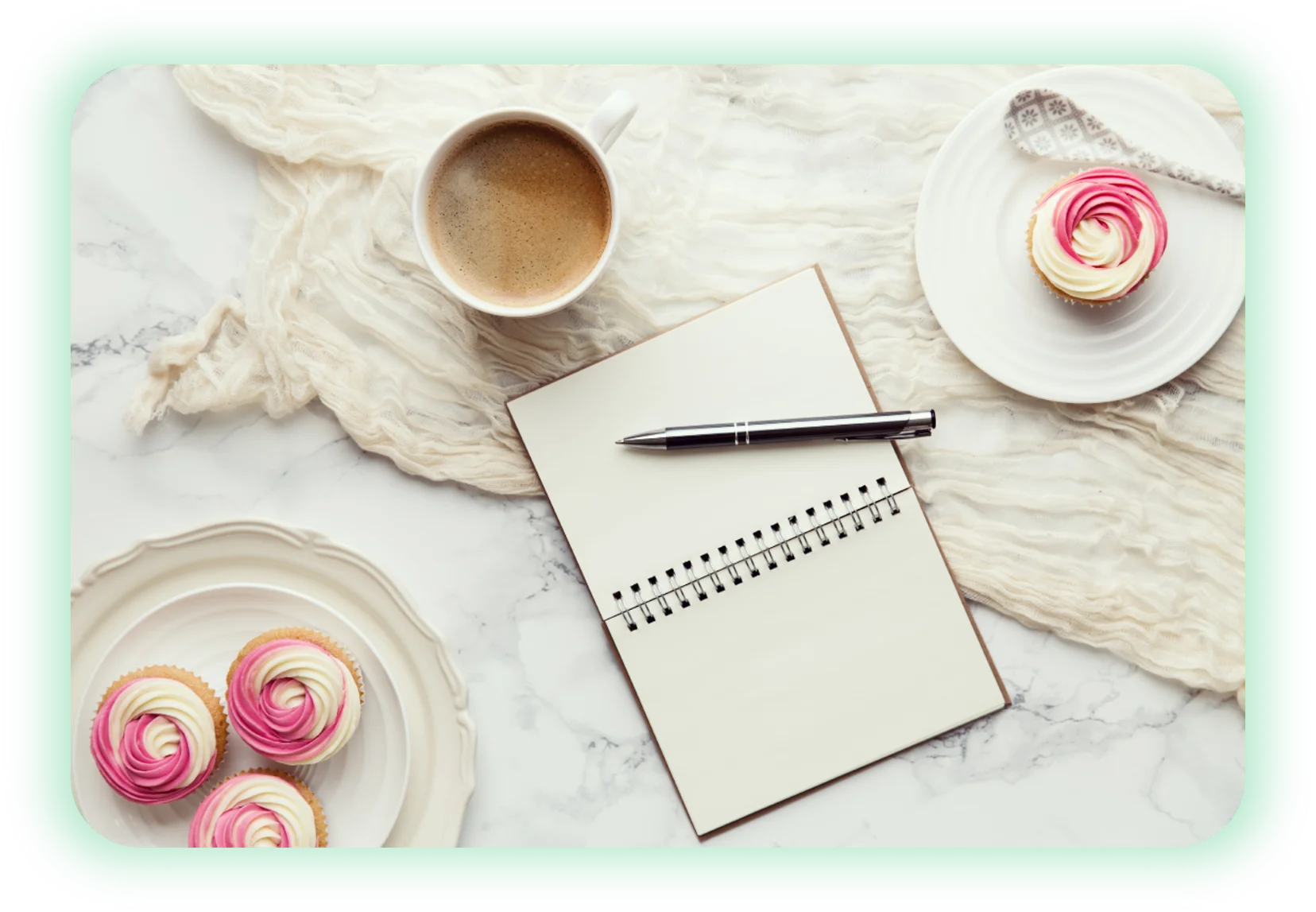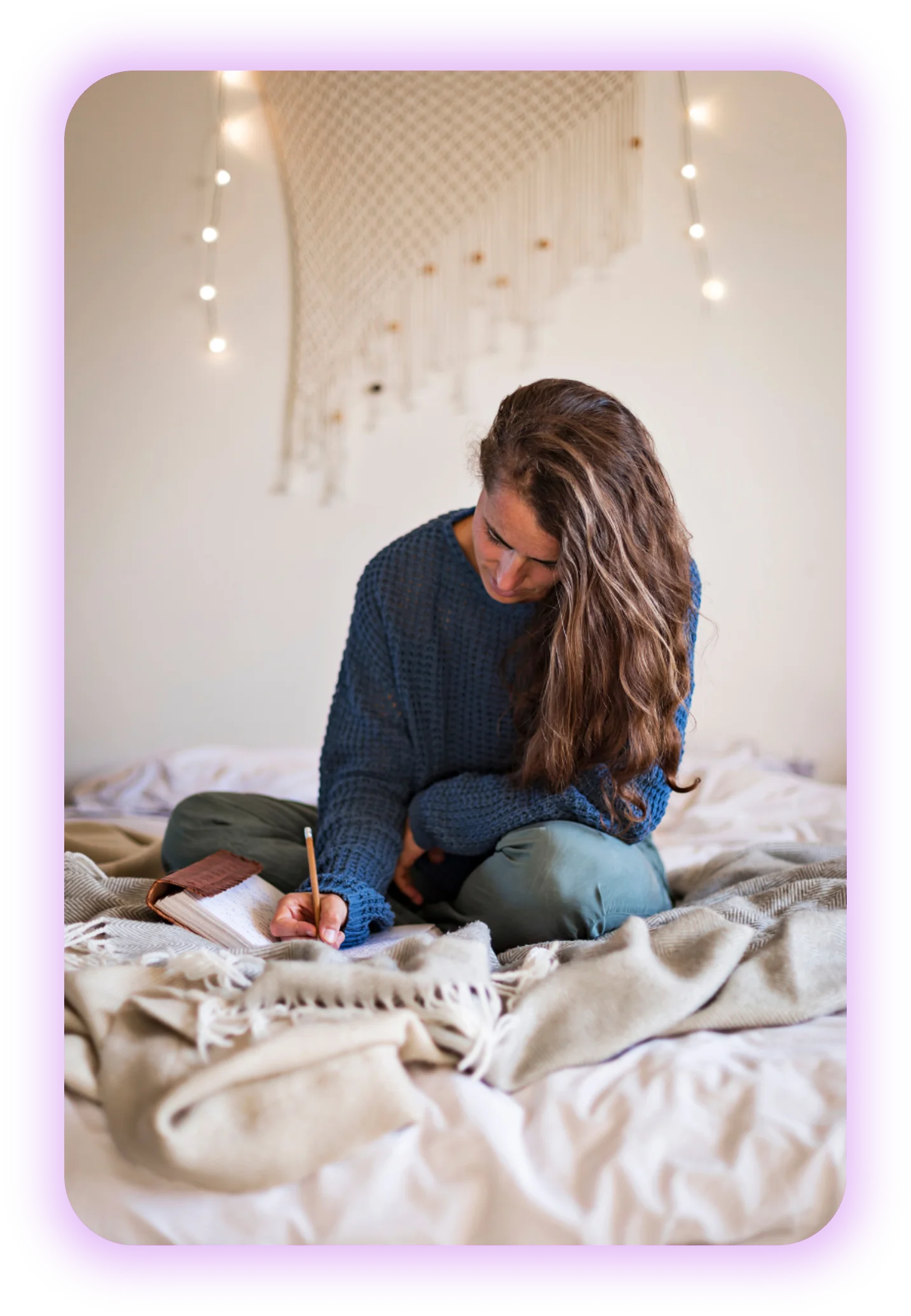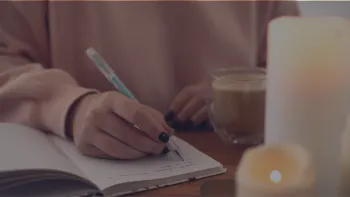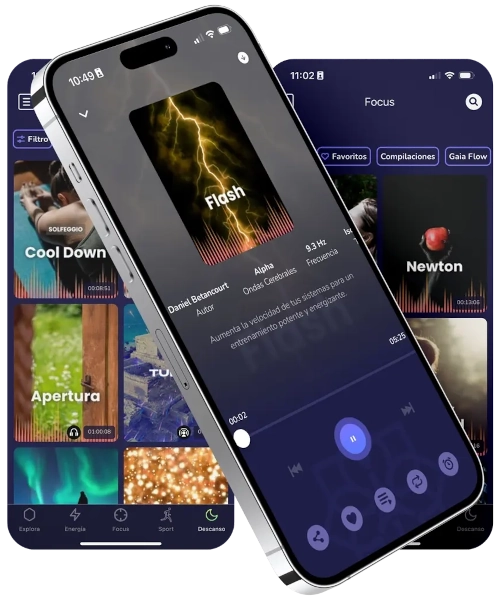STOP!
We invite you to read this article accompanied by specialized frequencies. Enjoy Aloharmony's exclusive music.

Delphi
Kike Santander
Concentration / Productivity | 8 Hz.
Do you want to start writing a personal journal? Do you need clarity about where to start and how? In this article, you will find some tools for writing and developing your self-awareness.
Although it is one of the oldest practices of humankind, it is challenging to sit down in front of a blank page to write. Knowing how to do it and being fluent in writing are actions that you will achieve with practice. The ideas will flow faster as you do it often.
Stoic philosophers, such as Marcus Aurelius, wrote daily, and thanks to those records, we can enjoy their wisdom. Anse, a personal journal can become a record of your thoughts, longings, emotions, and ideas. They may not reach the popularity of the Roman philosophers, but they will surely help you think clearly. A journal is a tool to regulate your interior self and shadows. Writing daily about what you have experienced allows you to process your emotions and thoughts more accurately. The techniques we will teach you will help you rationalize your experiences so you may become a spectator to command them and stop being a subject of what occurs.
Benefits of writing a personal journal
Writing a personal journal has multiple emotional and physical benefits. It helps us improve our self-esteem, gain self-awareness, and evaluate our behaviors. It also reduces stress and enables better sleep.
Moreover, according to recent studies, those who keep a diary strengthen their immune system and increase the organism's self-healing capacity, overcoming, before the rest, infectious processes.
On more than one occasion, we have considered starting. Still, we have not been able to turn the impulse into a routine, as is hygiene or eating at certain hours, so we invite you to take the first steps in the company of Aloharmony.
A personal journal is a way to reflect and process your daily experiences. This exercise will allow you to understand your emotions and sensations rationally. This understanding will help you process your problems and decide with a cool head. It is also a meditative act, forcing you to focus on a single task, thinking, reflecting, and writing. In that sense, journaling is a form of therapy and a way to exercise self-knowledge.

How to make a personal diary?
The first thing you should get when writing a personal journal is a notebook you like. Remember that you will write down your most intimate ideas in it. It is not something to share with other people, but it must be attractive to you. In these pages, you will write down your inner world, give yourself the pleasure of personalizing it, and make it yours as much as possible.
Therefore, an excellent first step is to find a notebook reflecting your sensibility and thinking. Stay away from what you want to show on the outside, and focus on your inner characteristics and struggles. Remember that a diary is a personal and self-knowledge text. You will record your daily experiences and feelings in it.
When should I make entries in my journal?
There are two ideal times to write in your journal: at the beginning of the day and before sleep. In the first case, it is advisable to focus on the goals you want to achieve, to process your dreams or nightmares, and to make daily affirmations. You can process what happened at night in the morning or project your day according to your aspirations.
In the evening, you can focus on revisiting your experiences during the day and evaluate the results achieved. In this case, you should focus on processing the positive or negative experiences and consciously accept them. Here, it is essential to thank for the positive and forgive yourself for the day's negative experiences.
Writing in a journal can be done anytime, but we recommend you do the exercise at the two mentioned moments. This way, you can organize your day, project it in the morning, and remember and process your experiences in the evening. This double exercise of projection and evaluation will give you better results. You will be able to start and end your day with full awareness.
Some ideas to begin writing
The options for writing in your journal are almost endless. If you find it challenging to organize your time to make two entries in one day, describe elements that identify you as a person. For example, you can start by defining your likes and dislikes, such as listing your favorite foods or songs, then go to deeper layers of self by asking yourself: How would a friend define me? How would an enemy define me? What do I think, and where do I stand on [any issue]?
If you start with baby steps, you will see that the ideas will come to you little by little. Don't be afraid to question yourself. Remember that no one will read your diary. Express your ideas without being afraid of what they imply, how they look, and how they sound.
We recommend the following techniques if you have a blockage and need help with what to write about in your journal.
- Write about your dreams and experiences at night. If you usually have vivid imaginations and want them to be more lucid and clear, start recording what happens while you sleep. This exercise will help you understand your unconscious and become more aware of your dreams.
- Organize your day and plans for the day. A diary is a tool to organize your day and daily activities better. In the morning, you can put your goals and classify them according to their priority, and in the evening, you can review and evaluate the results.
- Write a page in "automatic writing" mode. To activate your creative side, you can practice this technique. It consists of writing down your thoughts and feelings without a specific order or objective. This exercise can help you relax and better understand your fears and insecurities.
- Write daily affirmations. If you want to start your day with positivity and a positive mindset, then begin by writing an assertion several times. These simple sentences are a powerful tool to remind yourself that you can be your best self every day. Suppose you listened to the recommended track for this reading. In that case, you will know that on Aloharmony, you will find music with positive affirmations that, when listened to constantly, will help you attract everything you have wanted into your life. Manifest your desires!
- Keep a tally of activities for the day or week. A journal is a way to exercise your memory and process the events. This exercise is ideal if you feel disoriented and need to know the next step. Listing your memories in your journal will improve your memory and allow you to be more mindful and live your life more presently.
- Reflect on your relationships. Another helpful exercise is to remember what your relationships have been like. You can start by placing the people who have marked your life and your attitude towards them. This exercise can help you better establish boundaries and understand relationship patterns. Describe your close friends or acquaintances. Characterize them and write down some thoughts that come to your mind.
With these exercises, you can start writing in your journal. Remember that each activity is a form of self-knowledge and inquiry. As you register, you will achieve greater depth and more detailed conclusions. Do it often and try different techniques to find a balanced state of mind. We invite you to tune in to a theta wave track on the Aloharmony app and let your mind flow as you capture your thoughts in your personal journal.
Write a personal journal and delve into your conscience.
A personal journal is a way to reflect and delve deeper into your thoughts and aspirations. In that sense, it can help you process challenging experiences. This tool can also expand your creativity and imagination. You will have many ideas to create by searching through your longings and memories. In addition, you can delve deeper into your goals and objectives, especially since it is personal and there is no outside judgment.
Remember to choose an attractive notebook that represents your inner world. The exercises proposed in the article are most helpful when writing with a pen or pencil. Writing with your hand means an extension of your body. Registering with your hands will let your thoughts flow unreservedly.
Here is a small format to help you take your first steps and learn how to start writing in your personal journal.





